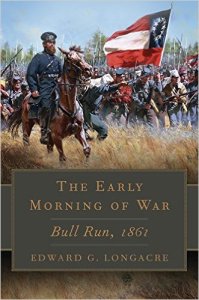 To recap, here’s how this works: as I read Edward Longacre’s study of the First Battle of Bull Run, The Early Morning of War, I put little Post-Its where I saw something with which I agreed or disagreed, or which I didn’t know, or which I did know and was really glad to see; essentially, anything that made me say “hmm…” So I’ll go through the book and cover in these updates where I put the Post-It and why. Some of these will be nit-picky for sure. Some of them will be issues that can’t have a right or wrong position. Some of them are, I think, cut and dry. So, here we go:
To recap, here’s how this works: as I read Edward Longacre’s study of the First Battle of Bull Run, The Early Morning of War, I put little Post-Its where I saw something with which I agreed or disagreed, or which I didn’t know, or which I did know and was really glad to see; essentially, anything that made me say “hmm…” So I’ll go through the book and cover in these updates where I put the Post-It and why. Some of these will be nit-picky for sure. Some of them will be issues that can’t have a right or wrong position. Some of them are, I think, cut and dry. So, here we go:
Chapter 2: The Fretful Virginian and the Hesitant Irishman
I see the actions in the Shenandoah Valley at this time as much less important to the story of First Bull Run than does pretty much everyone else, primarily because it figured so little in Federal planning, and even in the failure of that planning (more on that later, but I’ve written about it often). Needless to say, Mr. Longacre is not of the same opinion, and provides substantial coverage of that area of operations. I didn’t skip over this when reading the book, so I won’t skip over it here.
P. 45 – I was unaware that Joseph Johnston resigned from the army in 1837, to take a civilian position with the Topographical Bureau in Washington. This is similar to a tact taken by George Meade, who, like Johnston, was assigned to the artillery upon graduation from West Point and who, like Johnston, felt he was stagnating there, and who, like Johnston, moved to a civilian position in the Topographical Bureau, and who, like Johnston, used this as a backdoor later to return to the army in the more prestigious Topographical Engineers. I did not know that about Johnston (Longacre does not make the Meade connection, which is neither here nor there).
P. 61 – On this page, Longacre becomes the first author other than Russel Beatie to emphasize, in foreshadow, the influence that the character of Fitz John Porter may have had on his superior officer in the Shenandoah Valley, Robert Patterson.
P. 62 – The plan of how to move recruits to secure Washington in May of 1861 was devised by Patterson.
Chapter 3: Awaiting the Invader
P. 71 – A nice description of the geography around Bull Run, noting the convergence of major roads at Centreville, the Centreville Ridge, the thin population and poor soil.
P. 73 – The author points out the significance of the railroad junction at Manassas to both armies, and discussed the concerns of Robert E. Lee, who as Virginia’s head military honcho played a major role in the development of defenses in the area.
Pp. 74-75 – A nice description of the less than attractive personality of Beauregard’s predecessor in command Milledge Luke Bonham. At the end of the campaign, every member of his staff transferred elsewhere.
P. 79 – The author points out several times the importance of interior lines in the planning and disposition of Confederate forces, in the thinking of folks like Lee and Beauregard.
P. 81 – The author notes that, while Beauregard’s failure to form any organization larger than a brigade was an “unwieldy decentralization of authority,” at the same time it kept “things simple and avoid[ed] extra levels of command. Then too, ‘Old Bory’ was not sufficiently acquainted with his subordinates to pronounce them deserving of leading more than a brigade.”
P. 89 – On much maligned Confederate Commissary General Lucious B. Northrup: “A dispassionate evaluation of the evidence, however, must conclude that while he made mistakes, they were mainly due to inexperience rather than obstinacy and that too many of the problems that beset him and, to a lesser degree, Lieutenant Colonel Myers – especially the slow and erratic shipment of rations and equipment by overburdened railroads – were beyond their ability to solve.”
Part 7

[…] Part 3 […]
LikeLike
[…] Part 3 […]
LikeLike
I am looking forward to 2027, when this series is finished!
LikeLiked by 1 person
You’re a regular Harold Lloyd, Drew ;-)
LikeLike
The pace at which this is moving suggests that McClellan is actually writing it. :) Seriously, keep it coming.
LikeLiked by 1 person
[…] Part 3 […]
LikeLike
[…] Part 3 […]
LikeLike
[…] Part 3 […]
LikeLike